
Kent County is a county located in the U.S. state of Maryland. As of the 2020 census, its population was 19,198, making it the least populous county in Maryland. Its county seat is Chestertown. The county was named for the county of Kent in England. The county is part of the Mid-Eastern Shore region of the state, and the oldest county in Maryland.

Christ Church refers to both an Episcopal parish in Matapeake, Maryland and the historic church building in the Stevensville Historic District in Stevensville, Maryland, which the parish occupied from 1880 to 1995, and that is now a Lutheran church. Christ Church Parish was one of the original 30 Anglican parishes in the Province of Maryland.
Still Pond is a census-designated place in Kent County, Maryland, United States. Still Pond is located at the intersection of Maryland routes 292 and 566 on Still Pond Neck, south-southeast of Betterton and north of Chestertown. Much of the community is included in the Still Pond Historic District and it is notable as the first place in Maryland in which women gained the right to vote.

The Stevensville Historic District, also known as Historic Stevensville, is a national historic district in downtown Stevensville, Queen Anne's County, Maryland. It contains roughly 100 historic structures, and is listed on the National Register of Historic Places. It is located primarily along East Main Street, a portion of Love Point Road, and a former section of Cockey Lane.

The National Archives Site is an archeological site at the National Archives facility in College Park, Prince George's County, Maryland. The site contains archeological remains from prehistoric settlements during the Late Archaic period, c. 4000-1500 B.C. Stone artifacts recovered through archeological testing indicate that this camp served as a place of stone tool manufacture and probably as a staging point for hunting and foraging. Physical integrity of the prehistoric component is high, with little plow disturbance or admixture with artifacts from other periods. The presence of a small number of other artifacts, including the projectile points, a spokeshave, and utilized flakes, indicates that the site also served in other hunting and foraging pursuits. It is one of a relatively small percentage of known prehistoric properties in Maryland with undisturbed archeological deposits.

This is a list of the National Register of Historic Places listings in Talbot County, Maryland.
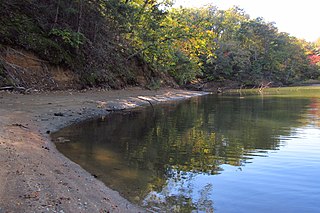
The Martins Pond Archeological Site is an archaeological site near Annapolis in Anne Arundel County, Maryland. It is a Middle-Late Woodland period site, with lithic, floral, and faunal remains.

This is a list of the National Register of Historic Places listings in Wicomico County, Maryland.

Brooklandville House, or the Valley Inn, is a historic restaurant and tavern building, and a former inn, located in Brooklandville, Baltimore County, Maryland. It is a 2+1⁄2-story stone structure facing the former railroad and dating from about 1832. It is associated with the Baltimore and Susquehanna Railroad, which crossed the property just to the south.
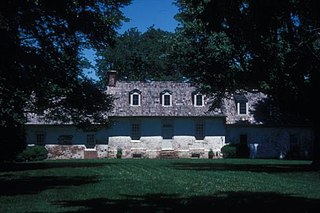
Clark's Conveniency is a historic home located near Pomona, Kent County, Maryland, United States. It is a 1+1⁄2-story, early-18th-century brick house built in three sections: the main block and a wing on the east and west ends. It is representative of the houses built by the smaller but still prosperous planters of 18th-century tidewater Maryland.
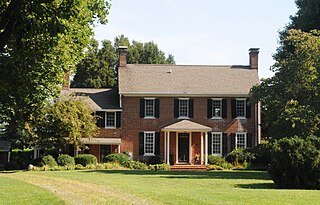
Hebron is a historic home located near Still Pond, Kent County, Maryland. It is a two-story brick farmhouse probably constructed in the mid to late 18th century by members of a prominent Kent County Quaker family.
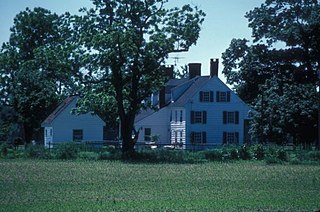
Shepherd's Delight, also known as the House on Part of Camelsworthmore, is a historic home located near Still Pond, Kent County, Maryland. It has a four-bay-long, 1+1⁄2-story main section with porches both front and back, and a four-bay-long, 2+1⁄2-story kitchen wing. It was built between 1767 and 1783, and added to again about 1810. Also on the property are two barns and a brick stable with modern sheds attached.
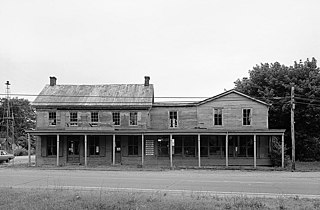
The George Harper Store is a historic crossroads general store located in Still Pond, Kent County, Maryland, united States. It is a late 19th-century five-bay frame commercial structure, two stories high with a central entrance and gable roof. Attached to it is a series of later additions, believed to date from about the turn of the 20th century. It operated as a store from 1894 to 1959.
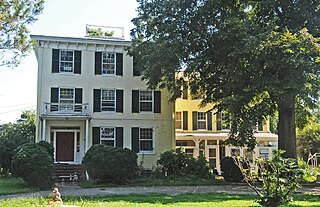
Woodland Hall is a historic home located near Kennedyville, Kent County, Maryland.
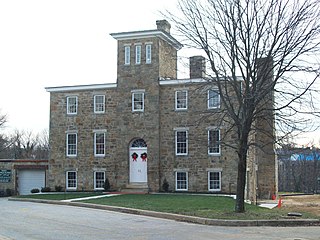
Baltimore County Jail is a historic jail located at Towson in Baltimore County, Maryland, United States. It was built in 1855 and is a two-story Italianate style stone building, measuring 52 feet wide and 62 feet deep. It consists of a five-bay-wide warden’s house with a central three story entry tower. In the rear is a cell block with three levels of jail cells and covered by a gable roof. The warden's house and tower features a low pyramidal hipped roof and 30-inch-thick (760 mm) walls. Attached to the warden's house is a stone garage built in 1940. It was used as a correctional facility until 2006.
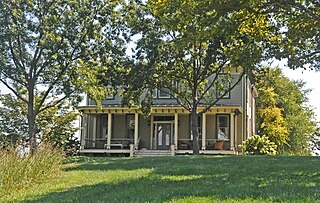
Gobbler Hill is a historic home located at Chestertown in Kent County, Maryland, United States. It was built in 1858 and is a center-hall plan frame house on a foundation of local fieldstone and brick. It is five bays wide, two bays deep, and two stories tall with late Greek Revival / early Italianate style details. It features a shallow hip roof surmounted by a tall belvedere and a full-width porch.

Charles Sumner Post #25, Grand Army of the Republic is a historic fraternal lodge building located in Chestertown, Kent County, Maryland. Named after Charles Sumner, it was constructed as a meeting hall about 1908 and is a two-story gable-front frame building, built on brick piers, with a rectangular floor plan. It is located in the Scotts Point area, a historically black area within the Chestertown Historic District, and was abandoned between 1985 and 2002. It is one of only two Grand Army of the Republic halls for African-American veterans known to survive in the Nation.
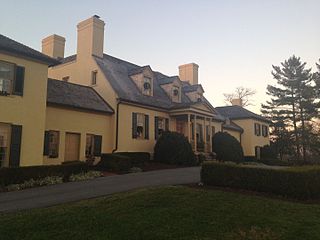
The Belmont Estate, now Belmont Manor and Historic Park, is a former plantation located at Elkridge, Howard County, Maryland, United States. Founded in the 1730s and known in the Colonial period as "Moore's Morning Choice", it was one of the earliest forced-labor farms in Howard County, Maryland. Its 1738 plantation house is one of the finest examples of Colonial Georgian architectural style in Maryland.
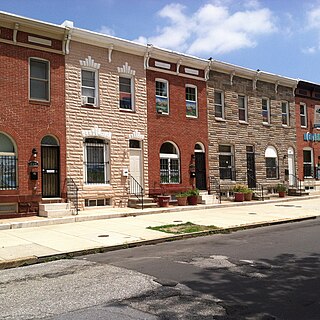
East Monument Historic District or Little Bohemia, is a national historic district in Baltimore, Maryland. It is a large residential area with a commercial strip along East Monument Street. It comprises approximately 88 whole and partial blocks. The residential area is composed primarily of rowhouses that were developed, beginning in the 1870s, as housing for Baltimore's growing Bohemian (Czech) immigrant community. During the late 19th and early 20th centuries the neighborhood was the heart of the Bohemian community in Baltimore. The Bohemian National Parish of the Roman Catholic Church, St. Wenceslaus, is located in the neighborhood. The historic district includes all of McElderry Park and Milton-Montford, most of Middle East and Madison-Eastend, and parts of Ellwood Park.

Hollins–Roundhouse Historic District is a national historic district in Baltimore, Maryland, United States. It is a primarily residential area characterized by 19th century rowhouses. The neighborhood is historically significant due to its association with the development of rail transportation in Maryland. Additional historical significance comes from the neighborhood's association with ethnic immigration to Baltimore. During the 1840s and 1850s the area was a center of settlement for Baltimore's German and Irish communities, many of whom immigrated to the United States to work in the rail industry. Later, from the 1880s to the 1920s, the neighborhood became established as the center of Baltimore's Lithuanian immigrant community. Because of the large Lithuanian population in the area north of Hollins Street, the area became known as Little Lithuania. A few remnants of the neighborhood's Lithuanian heritage still remain, such as Lithuanian Hall located on Hollins Street.























